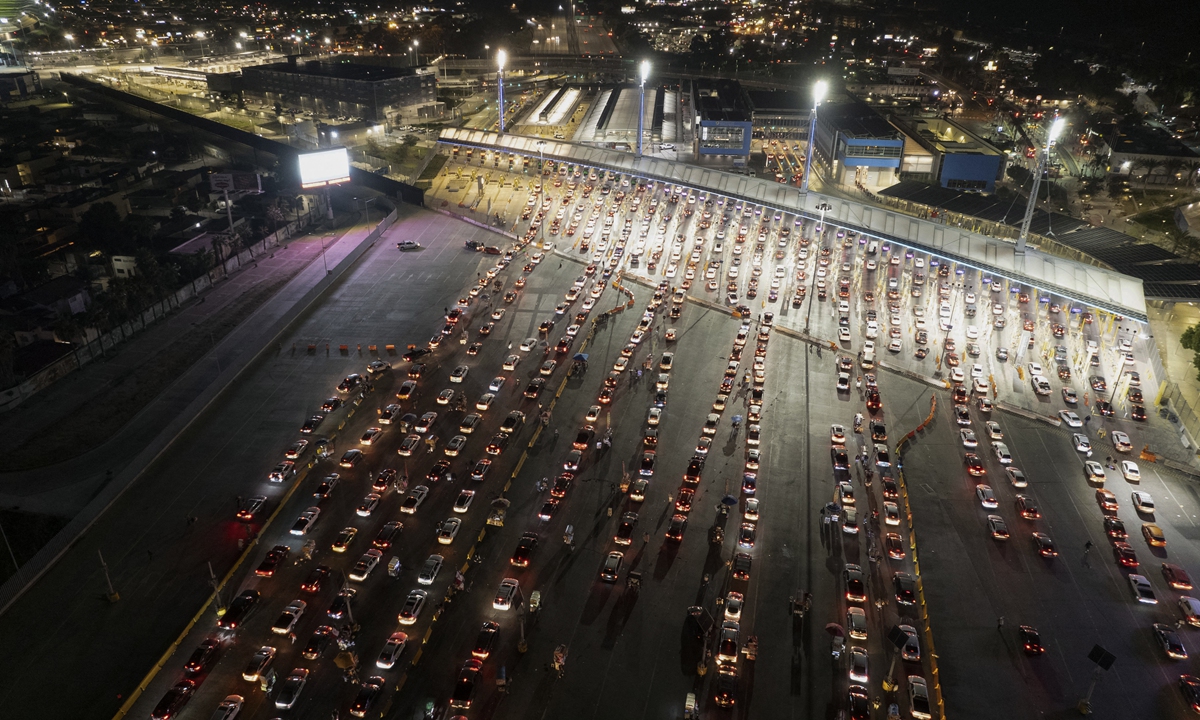
Vaccinated motorists line up to cross the border at the San Ysidro crossing port on the Mexico-US border in Tijuana, Baja California state, Mexico, on November 7, 2021. The US on Monday reopened its land borders with Mexico and Canada to foreigners vaccinated against COVID-19, almost 20 months after they were closed to non-essential traffic. Photo: AFP
While some countries like the US resumed international travel, new COVID-19 cases spiked in countries like Germany and France as global infections surpassed 250 million. When more Western countries reopen their borders, China has to continue adhering to its zero-tolerance policy, remaining as a must-have strategy to contain the virus at the lowest cost, Chinese senior epidemiologists warned.
Infections have been increasing again in Europe, given the colder temperatures and the fading of vaccine-induced immunity. Germany saw 201.1 new cases per 100,000 residents in the last week, compared to the previous 197.6 in December 2020, according to Euro News.

Empty seats at a street cafe on November 8, 2021 in Leipzig, Germany. The state of Saxony is the first state in Germany to bar people who are unvaccinated from entering restaurants, bars, hotels, gyms, hairdressers and other public venues. COVID-19 infections have skyrocketed in the past week across Germany. Approximately 90% of infected people being admitted to the hospital are unvaccinated. Photo: AFP
In Denmark, a local government proposed reinstating the use of a digital "corona pass" when residents visit bars and restaurants, as the country is fending off a third wave of the pandemic, Reuters reported on Monday.The resurgence occurred at a time when the US is reopening its borders to Europe. The WHO also warned in a recent press briefing that the continent could go back into the epicenter as it is battling new cases.
At the same time, Western media continued to cast doubts on China's zero-tolerance policy to handle the epidemic, citing the country's isolation from the world.
Some epidemiologists told the Global Times that China has gained huge benefits in insisting on this approach including public health benefits, economic recovery and employment, and it's not yet the right time to change the approach.
"We can't abandon the zero-tolerance now, as given the global pandemic situation, changing our epidemic prevention policies and lifting strict controls would lead to a catastrophic outcome," a senior public health expert close to the National Health Commission (NHC) told the Global Times on condition of anonymity in a recent interview.
Considering the overall health system situation, lifting the anti-epidemic measures means a sudden increase in infections, which will deliver a heavy blow to the health system and the country's economic and social development, the expert said, noting that as there is a regional imbalance, abandoning the current approach will lead to significant consequences.
The US reopened its borders on Monday to fully vaccinated international visitors, ending a 20-month travel restriction imposed in March last year, which is also seen as a pandemic milestone by some US media.
"Though reopening the border is a consistent policy that attaches importance to public health, there are concerns about the epidemic situation in the US," Chen Xi, an assistant professor of public health at Yale University, told the Global Times on Tuesday.
Despite the drop in daily infections, the numbers still remain relatively high and some epidemic hotspots are in the central and western regions with low vaccination rates, he noted. "The risks of traveling with the virus have increased," Chen said.
Some Chinese epidemiologists believe that it's still not time for Western countries like the US to lower border restrictions, although those countries made their decision based on the vaccination speed, but they fail to take other factors such as winter and the Delta variant into account.
"Infections in winter will increase given the experience last winter as people spend more time indoors and coronavirus-infected objects outdoors live longer in winter which increases the risk of being infected through indirect physical contact," Wang Guangfa, a respiratory expert at Peking University First Hospital, told the Global Times on Tuesday.
Vaccination rates in the US and main European countries have reached a relatively high level, that's why those countries have chosen to reopen, he said, noting that the problem is the Delta variant can achieve an ultrafast spread and there have been relatively high rates of breakthrough infections after vaccination.
A senior official from the top health authority also noted recently that China has no intention of changing its current anti-epidemic approach given repeated outbreaks in neighboring countries and across the world. Wu Liangyou, a deputy director from the NHC disease control bureau, said on Saturday that "we will continue to adhere to strict COVID-19 controls and build a solid barrier against imported cases and local transmissions," when he was asked about whether China considered abandoning its zero-tolerance policy.
The resurgence of COVID-19 cases in China now is still sporadic, although they appeared in about 20 provincial-level regions, Wang noted. "Situations will be much worse in China if the epidemic reaches the same level as Western countries. In China, a large population and limited medical resources leave China no choice but to insist on a zero-tolerance policy," he said.
When asked about when it would be best to lift the restrictions, the expert close to the NHC simply said "not now." "The regular anti-epidemic measures help us maintain normal social and economic functions, but China has not reached the conditions for lifting those measures or opening its borders," he said.
Zeng Guang, former chief epidemiologist of the Chinese Center for Disease Control and Prevention, was quoted as saying in a report by Chinese financial news outlet Caixin on Tuesday that there are several other aspects to be considered when governments decide to reopen the borders. Besides the public health perspective, there is also economic development, social stability and geopolitical relations, he said.
"Countries like the UK, Singapore, South Korea and Thailand reopened their borders, but did so because local governments face the pressure of economic growth and unemployment, as well as the rivalry of different political parties," Zeng said.
He also noted that those countries are not absolutely sure about the outcome, and they may return to a lockdown one day.



